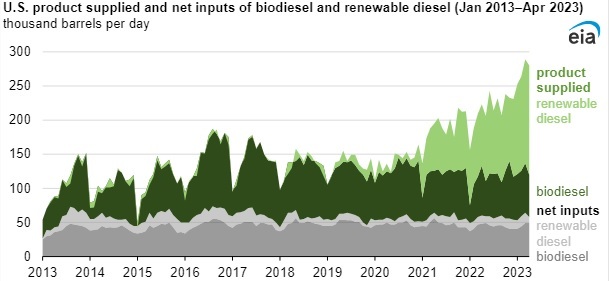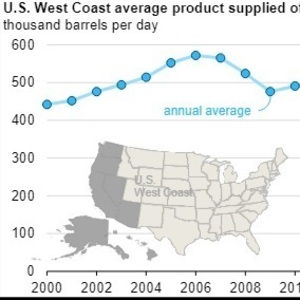EIA: Biofuels displace distillate fuel oil on the West Coast



July 10, 2023
BY U.S. Energy Information Administration
Last year, U.S. West Coast distillate consumption, as measured by product supplied, was at its lowest since 2002 and is on track to fall further this year. The growing use of biofuels instead of petroleum diesel is the primary cause for the decline. Renewable diesel has a growing share of the region’s diesel fuel market because clean-fuel programs have provided incentives for consuming it.
Renewable diesel and biodiesel are biofuels that can be used in place of petroleum distillate fuel oil. Distillate fuel oil is a refined petroleum product primarily used as diesel fuel in vehicles.
Renewable diesel is chemically identical to petroleum-based diesel fuel but is made using fats, oils, or greases rather than petroleum. Renewable diesel is a drop-in replacement for petroleum distillate; it can be used in diesel engines in any concentration.
Biodiesel is used the same way as renewable diesel and is made with the same feedstocks, but it’s blended (in concentrations of 20 percent or less) with petroleum distillate for vehicle use because it is chemically different from petroleum distillate.
Both biodiesel and renewable diesel are used to comply with the Renewable Fuel Standard (RFS), a federal program that requires transportation fuel sold in the United States to contain at least a specified minimum of renewable fuels. These biofuels are also used to meet California’s Low Carbon Fuel Standard (LCFS), Oregon’s Clean Fuels Program, and Washington’s Clean Fuels Program. These programs aim to reduce the carbon intensity of transportation fuel.
Advertisement
Advertisement
In January 2022, U.S. renewable diesel consumption surpassed biodiesel consumption for the first time and has continued to increase since then. Renewable diesel consumption has grown relative to biodiesel consumption because:
•Renewable diesel receives more credits under the RFS program than biodiesel.
•Petroleum refiners can convert their units to produce renewable diesel instead of petroleum products.
•Renewable diesel plants are larger than biodiesel plants and can take advantage of economies of scale.
•Renewable diesel can be blended in any concentration and performs better in the cold than biodiesel.
•Renewable diesel can be transported through the same pipelines as petroleum diesel.
Advertisement
Advertisement
Almost all of the country’s renewable diesel fuel is consumed in California, according to EIA estimates. Much of the renewable diesel not consumed in California is consumed in other states with clean fuel programs, such as Oregon and Washington. All three states are part of the U.S. West Coast region.
The growth in U.S. renewable diesel consumption had a more pronounced effect on West Coast distillate fuel consumption because of high biofuel consumption in California, Oregon, and Washington.
The decline in distillate fuel oil consumption in 2022 and in the first three months of 2023 is unique to the West Coast. In the rest of the United States, distillate fuel oil consumption increased, returning to pre-pandemic levels. The discrepancy in distillate fuel oil consumption between the West Coast and the rest of the United States demonstrates how much biofuel consumption has been displacing distillate fuel oil consumption on the West Coast.
Related Stories
The U.S EPA on July 17 released data showing more than 1.9 billion RINs were generated under the RFS during June, down 11% when compared to the same month of last year. Total RIN generation for the first half of 2025 reached 11.17 billion.
The U.S. EPA on July 17 published updated small refinery exemption (SRE) data, reporting that six new SRE petitions have been filed under the RFS during the past month. A total of 195 SRE petitions are now pending.
European biodiesel producer Greenergy on July 10 confirmed plans to shut down its biodiesel plant in Immingham, Lincolnshire, U.K. The company temporarily suspended operations at the facility earlier this year.
Aemetis Inc., a renewable natural gas and biofuels company, announced on July 17 that its India subsidiary, Universal Biofuels, appointed Anjaneyulu Ganji as chief financial officer, effective July 17.
Avia Solutions Group, the world's largest ACMI (aircraft, crew, maintenance, and insurance) provider, has partnered with DHL Express to reduce greenhouse gas emissions from its international shipments using SAF.
Upcoming Events










